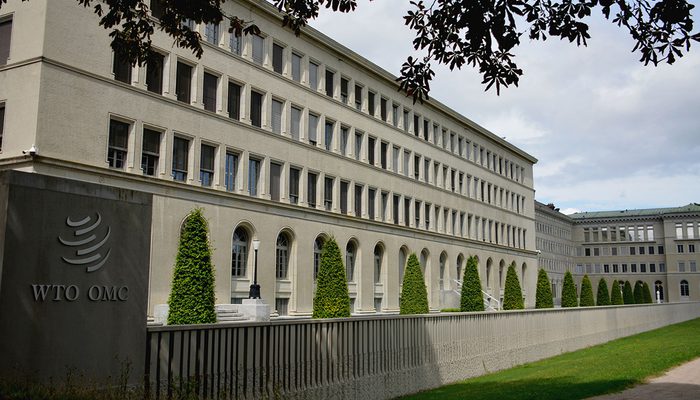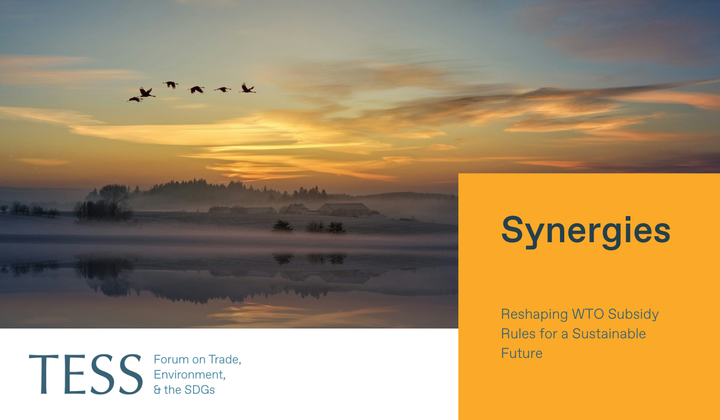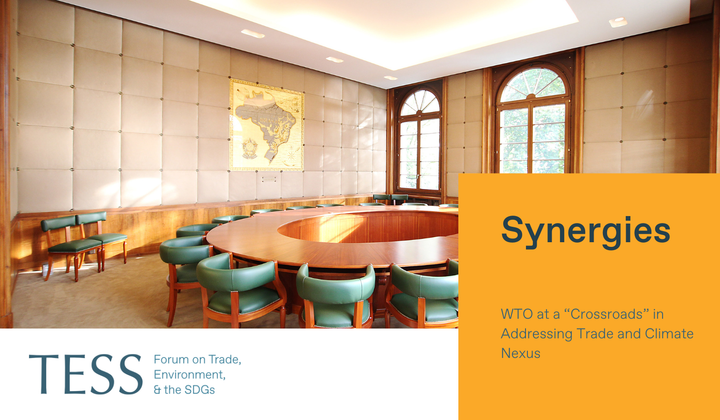A WTO reform agenda where sustainability is placed at the centre is an opportunity to shape a multilateral trading system that is equitable, sustainable, and inclusive.
This article is part of a Synergies series on reviving multilateralism curated by TESS titled From Vision to Action on Trade and Sustainability at the WTO.
Any views and opinions expressed are those of the author(s) and do not
necessarily reflect those of TESS or any of its partner organizations or
funders.
-----
Among the current negotiating topics on the agenda of the World Trade Organization (WTO), “WTO reform” stands out as a priority. At the Thirteenth WTO Ministerial Conference (MC13) held in 2024 in Abu Dhabi, WTO members reaffirmed their commitment “to work towards necessary reform of the WTO to improve all of its functions [ … ] with a view to enhancing the WTO's efficiency, effectiveness, and facilitation of Members' participation in WTO work.”
But the reform agenda at the WTO has morphed into a much wider mandate than simply improving transparency and procedural efficiency in the WTO council, committees, and processes. It encompasses long-standing issues such as special and differential treatment and fixing the WTO’s dispute settlement mechanism, including the Appellate Body. It has also expanded to include the "sustainability" agenda as a focal point of realignment of the trade system to the Sustainable Development Goals (SDGs) and the pillars of environmental, economic, and social sustainability embodied therein. Of these reform issues, the latter has probably ignited the most controversy among the WTO membership; and the very question of inclusion of sustainability concerns into the WTO’s remit, some would argue, explains the limited outcomes achieved at MC13.
The vision of a broad reform agenda paves the way for reimagining a multilateral system that is just and inclusive for non-state and state actors alike.
The vision of a broad reform agenda paves the way for not only enhancing the organization’s working procedures so that they are fairer and more accessible to all WTO members, but also for reimagining a multilateral system that is just and inclusive for non-state and state actors alike. Yet the real question for all countries involved in ongoing reform negotiations, including the smallest like the Caribbean Community (CARICOM) states, is: how can we participate in the reform negotiations at the WTO in a way that ultimately drives transformation and delivers on our development goals and priorities?
The Reform Agenda as a Gateway to Transformation and Advancing Sustainable Trade
For advocates of integrating sustainability into trade, efforts to expand the WTO’s agenda to a greater set of concerns of humanity represent a significant stride forward. Over the past two years, together with two professors from Yale University and Tufts Fletcher School of Diplomacy, I have been co-leading one such effort: the Remaking Trade for a Sustainable Future Project. The project sets forth a bold vision of a trade system where sustainability, in all of its dimensions, is placed at the centre of WTO reform efforts.
We engaged in a bottom-up process, organizing 10 workshops that brought together over 400 experts from the trade and sustainability communities and beyond. The workshops addressed multiple issues increasingly relevant to the trade agenda—encompassing climate action, industrial policy, ocean sustainability and conservation, the rights of marginalized groups, finance for developing countries, digital inclusion, financial and technological accessibility, and governance and institutional reform. This collaborative effort culminated in the Villars Framework for a Sustainable Trade System 2.0 (the Villars Framework), a comprehensive report offering recommendations for shaping the WTO into a more sustainable, equitable, people-centred, and transparent entity.
Challenges and Opportunities for CARICOM and Developing Countries
For CARICOM, the adoption of a sustainability agenda in trade negotiations and trade policy can only be successfully attempted if it aligns, or is made to align with, the region’s own development needs arising from the challenges it faces; including undiversified economies, lack of competitiveness, vulnerability to shocks and climatic catastrophes, and chronic debt.
While there are challenges, the agenda also presents opportunities for the region. As the Villars Framework highlights, developing countries can take advantage of these opportunities by sustainably managing their ocean resources (which CARICOM states have in abundance), enhancing food security through favourable trade and agricultural policies, facilitating the transfer of green technologies, and securing access for sustainably produced goods and services. The Villars Framework also calls for promoting carbon market opportunities under the Paris Agreement where many developing countries, including CARICOM states, have expressed interest, and offering more targeted funding by developed countries to meet the adjustment costs that that the new agenda imposes.
At the same time, the sustainability agenda has also been accompanied by increases in unilateral industrial “green” policies from the Global North that are hindering the export potential of CARICOM states and other developing regions. For example, a 2024 report finds that the EU’s Carbon Border Adjustment Mechanism will negatively impact Trinidad and Tobago’s exports of ammonia and fertilizers to the EU, rendering them less competitive. These types of measures will only increase as countries take matters into their own hands to meet their Paris and other environmental targets. The Villars Framework calls for more participation by developing countries in standard setting for the new sustainability rules. It also recommends a more inclusive approach to WTO subsidy disciplines, which, with the rise of such measures by developed countries, will need to be updated to balance the trade restrictiveness of subsidies with their sustainability impact.
Broadening Stakeholder Participation
Another key topic lies in bringing more stakeholders into the trade policymaking and negotiating process. While there is concern that broadening stakeholder participation might overshadow the specific needs of developing countries like those in CARICOM, a more inclusive approach could enrich the trade dialogue. My own institution, the Shridath Ramphal Centre for International Trade Law, Policy and Services (SRC), has experienced the value of this approach, having been invited to participate in sustainability discussions organized by civil society groups and non-governmental organizations (NGOs), such as TESS and IISD. Experiences from the 2023 UN Climate Conference (COP28) illustrate the benefits of incorporating diverse perspectives from different stakeholders, including those from entrepreneurs, MSMEs (micro, small, and medium-sized enterprises), women, indigenous communities, NGOs, and academic institutions.
The WTO must endeavour to amplify these varied voices, as they are integral to ensuring that the trade system leads to a fairer distribution of gains and provides greater procedural access to the levers of power.
The WTO must endeavour to amplify these varied voices, as they are integral to ensuring that the trade system leads to a fairer distribution of gains and provides greater procedural access to the levers of power. Here again, the Villars Framework dedicates an entire chapter to the “social sustainability” agenda and makes specific recommendations to advance that dimension, including proposing that all trade agreements and negotiations include ex ante and ex post sustainability impact assessments to evaluate how trade has, does, and will impact different groups, especially the traditionally marginalized ones.
But the inclusive agenda is also about ensuring that the smallest voices among the membership can be heard, especially on issues vital to their interests. CARICOM’s vocal and visible participation in the fisheries subsidies negotiations at MC12 and MC13 demonstrates how the smallest voices—when used to defend the interests of their constituencies like fisherfolk in the region who depend on the oceans for their subsistence and therefore should receive special accommodation in the ongoing negotiations—can be effective
Consensus or No Consensus?
A critical concern in these discussions is how these diverse interests and voices can be integrated into the WTO agenda. While the principle of “consensus” at the WTO serves as a safeguard against the dominance of larger interests, it should not impede progress on issues critical to smaller nations like those in CARICOM. CARICOM states are active in various plurilateral, member-driven initiatives, such as Investment Facilitation for Development, Dialogue on Plastic Pollution, and Trade and Environmental Sustainability Structured Discussions. Notably, a CARICOM ambassador chairs the group on MSMEs. If consensus cannot be reached on continuing these discussions, the interests of these smaller economies could be adversely affected.
The Villars Framework proposes that the WTO consider a new decision-making mechanism allowing a majority of members to agree on procedural decisions, such as setting up new plurilateral negotiations or adopting an agenda so that progress can be made. For the more substantive decisions, and to ensure that smaller voices are not drowned out, the consensus rule still holds high value as a bastion against majority rule. But there must also be a balance to ensure that the minority do not hold up progress, or conversely, that more powerful voices do not silence the less powerful minority. The Villars Framework therefore promotes a form of “responsible consensus” on more substantive issues, encouraging countries not to arbitrarily veto decisions but rather to opt out of decisions they find contrary to their vital interests.
Is Special and Differential Treatment Still Relevant?
Special and differential treatment remains a cornerstone principle for CARICOM in the WTO reform dialogue. Like other developing countries, CARICOM states have legitimate concerns about the effectiveness of special and differential treatment in integrating their economies into the global trade system. The controversy primarily revolves around the eligibility for special and differential treatment—which countries are entitled to special relaxations from the rules, such as extended timelines and preferential access.
Setting aside the debate over whether larger emerging economies like China, India, and South Africa should be considered developing, CARICOM can certainly advocate for an agenda that acknowledges its unique vulnerabilities. Such a proposal would actually provide the economic basis for differentiation of small states based on objective criteria such as the Multidimensional Vulnerability Index, adopted by the United Nations in July 2024, which accounts for environmental and economic vulnerabilities. Additionally, legal recognition in other agreements, including the Paris Agreement, should be considered as grounds for CARICOM to receive greater support in meeting the financial demands imposed on them. This raises the question: why should these vulnerabilities not be grounds for special accommodation under trade rules as well?
Why should these environmental and economic vulnerabilities not be grounds for special accommodation under trade rules as well?
A Critical Juncture for CARICOM and the Global Trade System
Despite the limited gains among members in advancing the broader WTO reform agenda at MC13, the conversations it has generated, and the opportunities it can unleash, holds particular significance for CARICOM, whose members have historically adopted a conservative approach to trade negotiations, especially regarding the sustainability agenda. These opportunities are not just important—if properly managed, they can be transformational. They present an opportunity for CARICOM states to reengage on new terms with the trade system and to defend their historical interests for special and differential treatment on a more widely accepted basis—environmental vulnerability. Moreover, the agenda provides a basis for a meaningful debate and engagement on how the trade system can be more inclusive, fair, and responsive to the needs of Caribbean people.
The sustainability agenda has taken off as a global preoccupation and there is no turning back. The Remaking Trade for a Sustainable Future Project will continue to help shape the WTO’s reform agenda. It will also be on the frontiers of a new phase of engagement that reaches all parts of the international trade system, including countries, regions, and broader non-governmental constituencies, so that true realignment of the trade system with the SDGs can be achieved.
----------
Jan Yves Remy is Director of the Shridath Ramphal Centre for International Trade Law, Policy and Services at the University of West Indies, Cave Hill Campus , Co-Lead of the Remaking Trade Project for a Sustainable Future, and WTO Chair for the University of the West Indies, Cave Hill Campus (Barbados).
-----
Synergies by TESS is a blog dedicated to promoting inclusive policy dialogue at the intersection of trade, environment, and sustainable development, drawing on perspectives from a range of experts from around the globe. The editor is Fabrice Lehmann.
Disclaimer
Any views and opinions expressed on Synergies are those of the author(s) and do not necessarily reflect those of TESS or any of its partner organizations or funders.
License
All of the content on Synergies is licensed under a Creative Commons Attribution-NonCommercial-ShareAlike 4.0 International (CC BY-NC-SA 4.0)
license. This means you are welcome to adapt, copy, and share it on your
platforms with attribution to the source and author(s), but not for
commercial purposes. You must also share it under the same CC BY-NC-SA
4.0 license.
If you would like to reuse any material published here or if you have any other question related to Synergies, send an email to fabrice.lehmann@graduateinstitute.ch.
TESS at the World Trade Organization
This work is part of our initiative supporting inclusive cooperation
on trade, environment, and sustainable development at the WTO.





